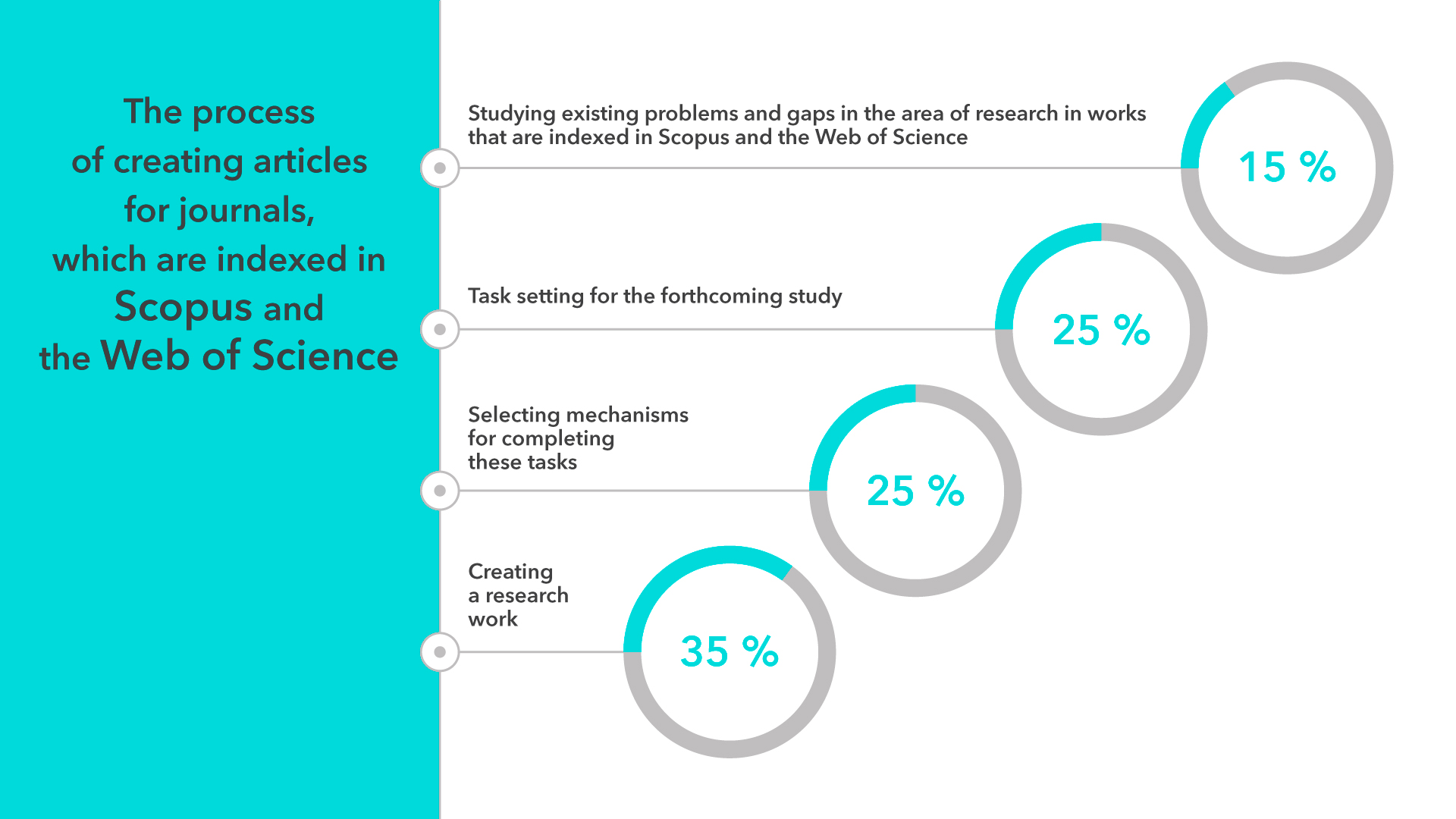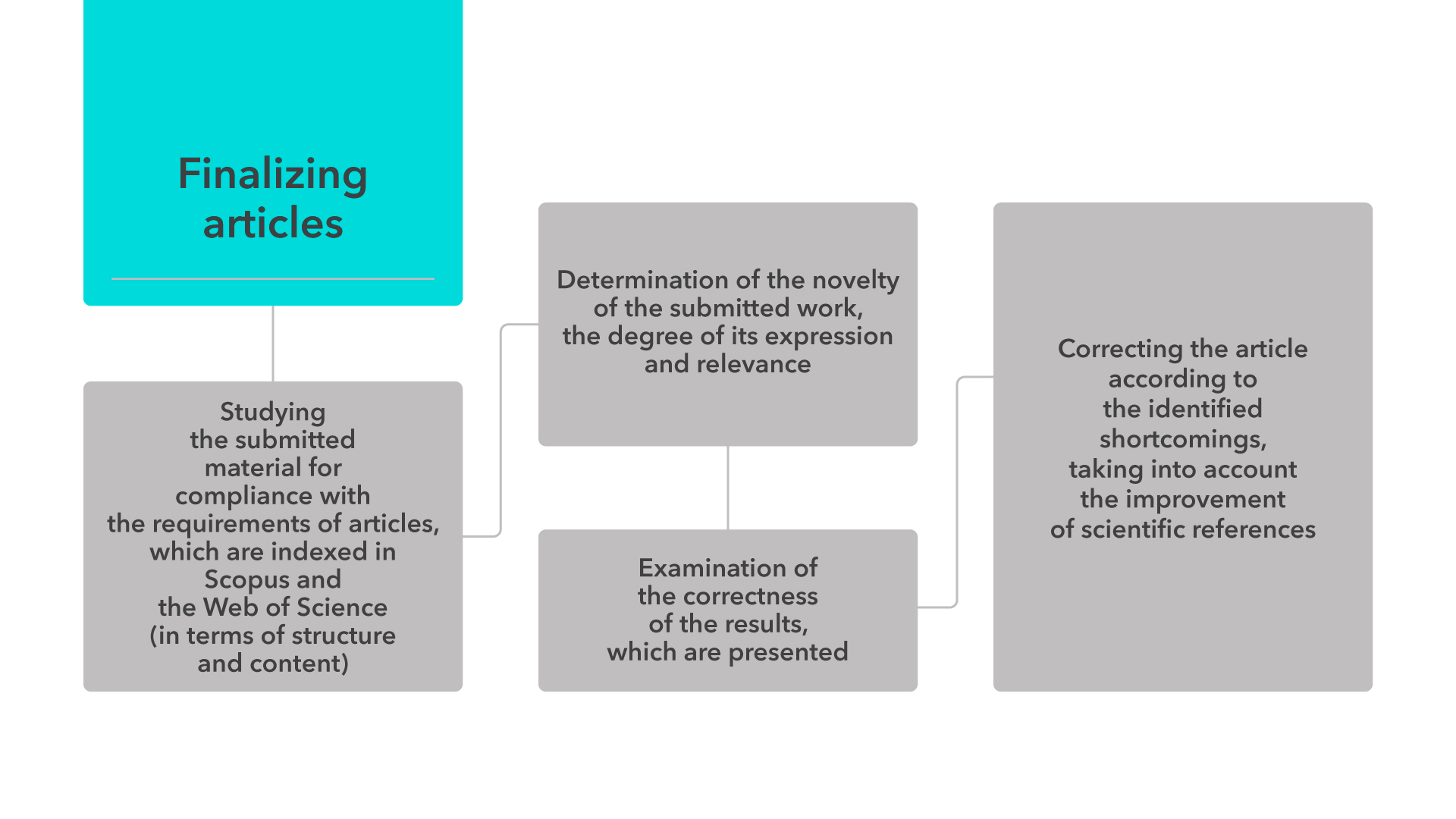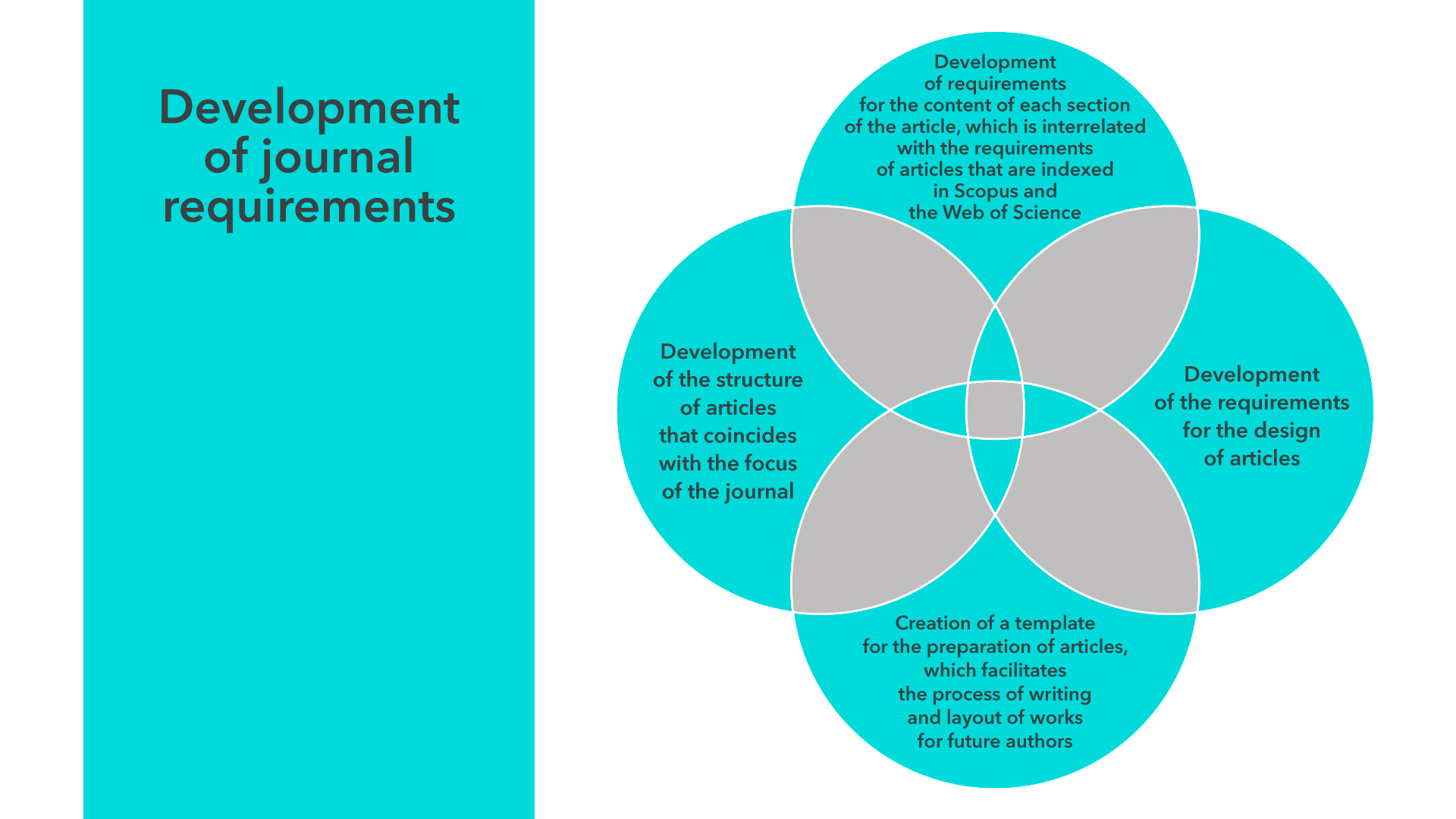
Writing articles for journals indexed in Scopus and Web of Science
Writing articles for international scientometric databases (Scopus, WoS) is a complex process that requires not only knowledge and understanding characteristics of a specific professional field, but also developed professional skills in writing scientific articles. While writing articles, you should choose the most appropriate article structure (IMRAD, review article structure, etc.); select the literary sources that will form the basis of the study; compare research objectives with the main results of the study, etc.
Writing articles for the scientometric databases Scopus and WoS requires understanding characteristics of articles published in peer-reviewed journals as their requirements for articles differ from HAC ones. Approaches to writing articles can also vary depending on the research topic. It is important to take into account the way to present the materials, which should fulfill scientific requirements, and avoid commonly used words that do not meet the criteria of scientific papers. The absence of stereotypes combined with an extraordinary approach and a high level of responsibility for writing a unique scientific paper characterize the process of writing articles. We contribute to writing articles for Scopus, WoS, which meet international scientific requirements.
Writing articles for HAC and other international and professional databases
Writing articles for HAC differ from writing articles for Scopus and WoS by a changed structure of the article, the presentation of scientific materials, requirements for the literature sources used. Articles for HAC journals are characterized by logic and consistency in presentation of the materials, which meets the requirements of the Ministry of Education and Science of Ukraine.
Writing articles for international and professional databases often reflects the specifics of the region in which the journal was registered. Writing requirements are different from the requirements of journals indexed in WoS and Scopus, which implies an individual approach to each article.

Writing articles for specific journals
Writing articles for specific journals needs studying the requirements for a single scientific publication. To defend master, candidate, or doctoral dissertations, there may be a need to publish an article in a specific journal due to the requirements of the supervisor or department. Writing articles for specific journals requires understanding not only the requirements of a single journal, but also the specifics of articles published in Scopus and WoS, which is reflected at a high level of materials written.

The company “In.Science” will assist in writing a scientific paper based on the author’s research or topics presented meeting the requirements of a specific journal suggested by the client.
Finalizing articles
Finalization of scientific articles improves the quality of the article previously written by the author, which affects its publication in rating journals. There is a need of knowledge and time to study changes and improvements to the requirements for articles published in Scopus, WoS, as well as HAC and other international and professional databases.
The customer can provide a basic article for revision, and our specialists will improve the quality of the article by revising the structure of the work, splitting the information into relevant sections, and enhancing the materials presented. Revision of the article can be done at each stage, starting with finalizing the main materials and results of the research; improving research methodology, to which journal reviewers often provide comments. Additionally, it can include literature review and discussion sections that both reflect the research topic, and, despite similar approaches to writing them, should be unique in presenting information. The finalization of the article can also involve proofreading the translation of the article, which requires understanding the basic terminology and narrowly focused knowledge. A written article most often includes visualization materials (figures, tables), which should be of high quality.
Article revision based on the reviewer’s or editor’s comments
The revision of articles according to the reviewer’s or editor’s comments is based not only on the general criteria of journals indexed in Web of Science, Scopus, but also on specific comments that were obtained as a result of a preliminary evaluation of the submitted paper. We revise articles in accordance with the submitted comments and reason answers. The reviewer’s or editor’s comments can be quite specific, which implies the search for new approaches to the transformation of scientific work. The complexity of revision can be proportional to the rating of the scientific journal.

Editing articles in accordance with the requirements of journals (formatting articles)
While reviewing and accepting an article, not only the content and quality of the paper have an importance, but also its compliance with the technical requirements of the journal. The journal provides specific requirements for formatting articles, including a text, bibliography, figures, and tables. Particular attention should be paid to all sections of the article, since the title of the topic may differ in format from the titles of sections. The formatting of the formulas should correspond to the style of the journal, be presented in an editable form, and not in the format of illustrations. The list of references is one of the first elements that reviewers and editors of articles pay attention to, which is associated with a variety of formatting styles (American Psychological Association (APA), Harvard, Vancouver, etc.) that may be acceptable for a single journal. An article edited in accordance with the requirements of a single journal leads to a more loyal attitude of the editor towards it, and, as a result, to its further consideration and transfer to reviewers.
When editing articles, the accuracy of indicating the author’s data and formatting the list of references is important, because it influences the correct indexing in international databases. It affects the creation of the author’s profile in databases, as well as an increase in the scientometric parameters of the scientist (h-index) as a result of the correct citation of literature sources.

Professional scientific translation
Rating journals require some elements of the article or the entire scientific paper in English or another language, which implies a professional scientific translation. When the article translated, it is important not to lose the scientific value of the article and the efforts of the author, which can happen in case of a lack of understanding of specific scientific terminology in another language. Professional scientific translation is directly connected with the quality of the article and affects the positive comment of the reviewer. The company “In.Science” assists in providing professional proofreading previously translated articles, as well as scientific translation of the article written.
Assistance in the selection of scientific literature on the subject of the study
Selecting relevant scientific literature allows reflecting the research topics in accordance with the international requirements of the Scopus or WoS indexed journals. Relevant scientific literature can be used for Literature Review and Discussion sections, and also influences writing Introduction section. The study of other literary sources is necessary to formulate the novelty of the future research, identify gaps in the chosen scientific direction. The selection of scientific literature on the subject of research can assist to formulate the aims of the article, which will be relevant for journals meeting international requirements.
Client article audit
An audit of an article written by a client helps determine the degree of its finalization to meet the requirements of international journals. In.Science specialists will assist in identifying sections and elements of the article, the quality of which should be improved. While writing an article, the author may miss important details that reflect the specifics of the topic chosen and affect the value of a scientific research. An audit of the article written by the client will allow identifying gaps and completing them before submitting the article to the journal.
Article plan development
The development of an article plan helps understand not only the structure of an article, but also the most significant elements that are the essence of the main part of the study.

The plan of the article allows presenting scientific information consistently that facilitates the process of writing a scientific article. The preliminary plan is aimed at determining the uniqueness and immediacy of a scientific article based on its topic. The results of the article should be directly related to the thematic area and do not include previously published materials.
Abstracts for scientific conferences
Participation in conferences and other scientific events requires pre-prepared research abstracts. Abstracts contribute to the brief understanding of the research results of a scientist and influence the increase in their rating directly during reading the material. Abstracts reflect the relevance and uniqueness of the work, as well as the degree of scientific development of the problem.

Development of journal requirements
One of the elements that reflects the quality of the journal is the preparation of articles in a uniform format. Articles should be unique but also presented in a uniform format. Preparation of requirements for the article formatting includes developing requirements for each of the sections (introduction, methodology, results, discussion, conclusions, list of references, if the structure is IMRAD), article title, author’s data, abstract, keywords, etc. The requirements for the content of the article are taken into account while developing journal requirements. We also can assist in writing information for journal sites that seek approval for inclusion in Scopus, Web of Science.
Training in writing scientific articles
The process of writing scientific paper should be based on professionalism and understanding of the specifics. Our team, based on their experience, will allow the future author to master the skills in writing scientific papers, taking into account the characteristics of each section of a scientific article. We will study the characteristics of the types of articles (scientific, review, etc.), as the structure of the article depends on its type. Writing an article should be based on the selection of the right topic, the preparation of an introduction and a literature review. It is important to develop the ways to present information in the Results section, directly related to the Methodology, Abstract, and Conclusions section. The Discussion section is written on their basis. Training in writing scientific articles is based on the study of theoretical aspects with their direct practical application and feedback.